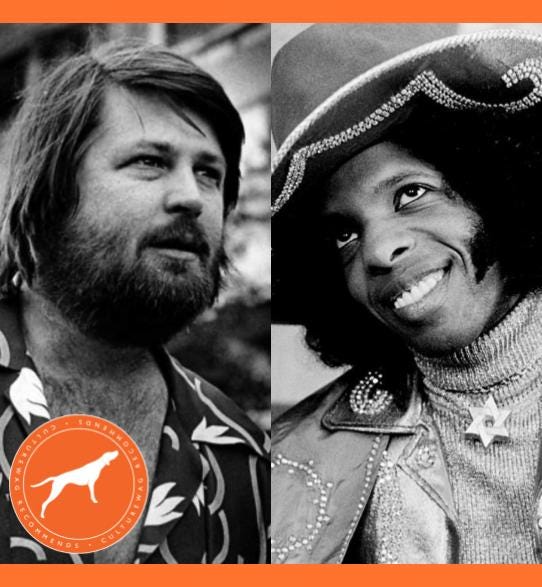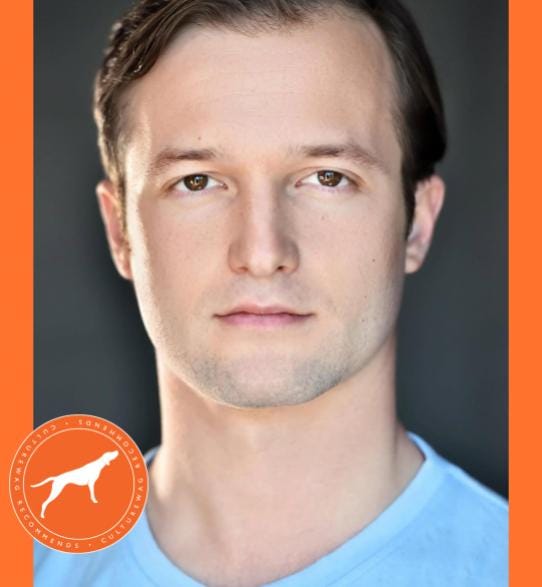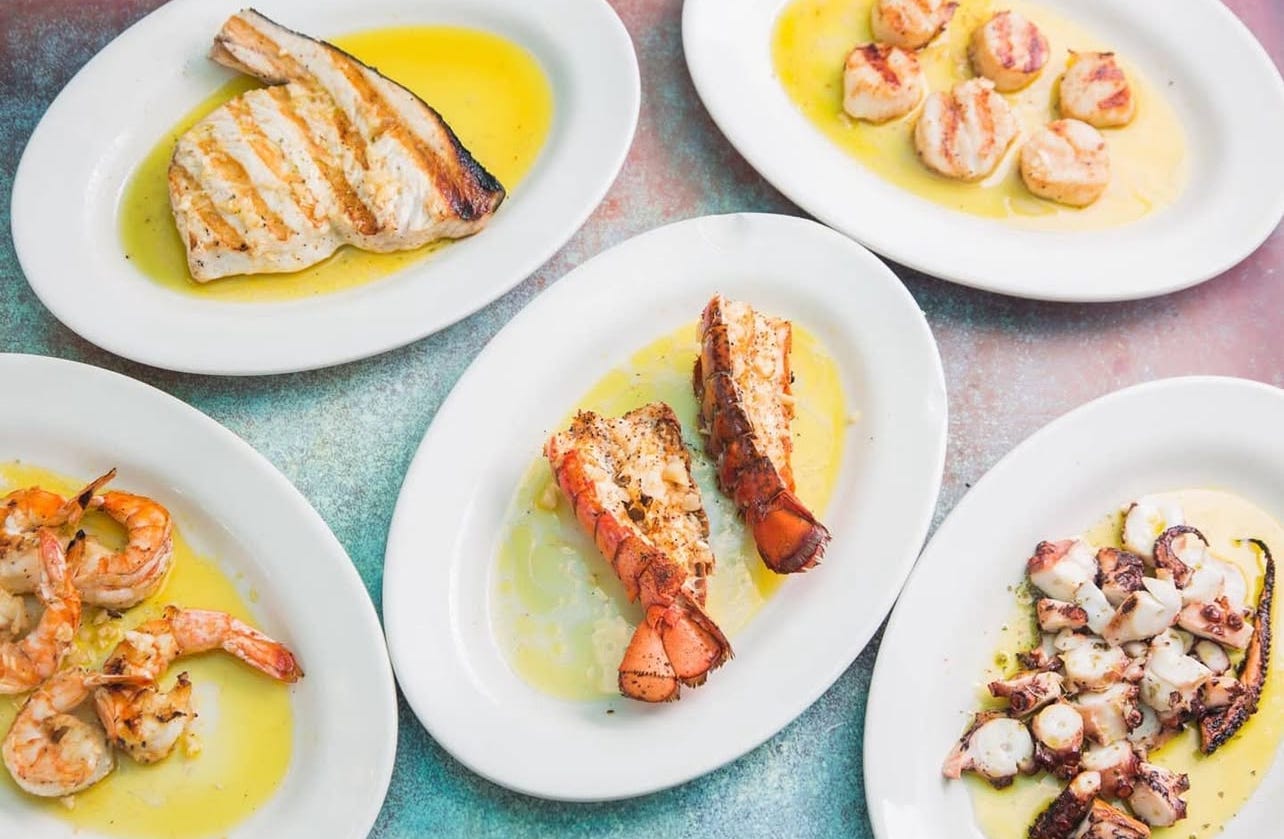California Dreamers
Brian Wilson, Sly Stone, and California Twilight. Plus: Your Weekend Recs, Three Glorious Things from Brandon Lessard, and more...
Dear Wags,
Before California became a four-letter word in certain quarters, it conquered the world’s imagination. The ingenuities of the 20th century—cars, planes, suburbia, atom bombs, tech, mass media, globalization—powered California's blazing ascent from frontier to colossus. In 1900, the state’s population was just under 1.5 million. By 2000, it had soared to nearly 34 million. Today, it approaches 40 million. Despite California’s rolling crises, its $4.1 trillion economy is the world’s fourth-largest, behind only Germany, China, and the rest of the United States. New York never caught it; booming Texas and Florida still lag in pursuit.
California’s true superpower is cultural. It innovated in movies, television, and the internet. It reduced fame to another consumer product and engineered modern life as we know it. If the state appears to be on a collision course with the rest of America, maybe it’s because the rest of the country cannot ignore it.
During another tense week for their home state, a pair of enormously influential Californians, Brian Wilson and Sly Stone, died within days of each other—Stone on June 9, Wilson on June 11. Both were products of California’s gilded, postwar boom.
Wilson’s parents came to the state as children from the Midwest; his volatile father, Murry, worked as a machinist and bought a two-bedroom home on West 119th Street in Hawthorne, a suburb that flourished with Southern California’s defense and aeronautics industries. Brian was born in the boom year of 1942.
Like many Black Californians, the Stewarts migrated from Texas in the same era. Born Sylvester Stewart in 1943, Sly came of age in the blue-collar Bay Area city of Vallejo, where his father, K.C., owned a cleaning business. The family lived in a small home K.C. built on Denio Street.
Like Hawthorne, Vallejo was a World War II boomtown, drawing workers to good jobs at the Mare Island Naval Shipyard. Both communities sprouted affordable utopias to house legions of newcomers. The new neighborhoods were sorted by race: Hawthorne was a sundown town girded by restrictive covenants; Vallejo’s neighborhoods were rigorously segregated. In 1944, protests at Mare Island led to 50 Black sailors being charged with mutiny; Hawthorne resisted integration until the Fair Housing Act of 1968.
In the years leading up to the 21st century, both towns underwent profound demographic shifts. More than half of Hawthorne’s population now identifies as Hispanic or Latino, while Vallejo is one of the most diverse communities in North America, with roughly equal numbers of Hispanic, Asian, Black, and White residents. Nearly one in ten identify as multiracial.
In the prosperous, promising 1950s, Wilson and Stone came of age in parallel Californias—South and North, white and Black, surf and soul. Their families were musical; the Wilsons gathered around the family organ, while the Stewarts were steeped in the gospel sounds of their Pentecostal church. Brian turned 18 in 1960; Sly in 1961. They were prodigies old enough to lead a cultural revolution, but old enough to miss the Vietnam draft lottery in 1969.
Obituaries may labor over their celebrity, but what they shared was erratic pop genius. Wilson, who didn’t surf, lifted beachy harmonies to baroque transcendence, borrowing from Chuck Berry, the Four Freshmen, Phil Spector, and George Gershwin. Stone fused gospel, soul, and psychedelia into a raw and radical sound, drawing on the Beatles, Booker T. and the M.G.'s, and James Brown. One shaped his sound into pocket symphonies of longing; the other built a riotous groove. Both reimagined American music from California—two visions spun from the same golden dream.
The California that produced them was sunny, hopeful, and increasingly anarchic. It stood at the vanguard of protest movements, alternative lifestyles, and the drug culture—but also incubated hard-right Orange County Republicanism. West Coast flakiness and ferment—L.S.D., Nixon, Esalen, the Rand Corporation, Didion, the Doors, Manson, Reagan, Jonestown—was a fierce crucible of American ideas.
The world that made room for their weirdness also threatened to consume them. Both Wilson and Stone struggled with mental illness and addiction. Each was exploited by grifters and retreated from the spotlight. In later life, they were rediscovered by new generations of critics and fans. Their contributions to music are strange, resonant, and eternal.
Above all, they were Californians, shaped by sunshine and contradictions. The Beach Boys may be associated with the endless summer of midcentury America, but Wilson tethered "Good Vibrations" to melancholy—a loneliness gleaming suburban affluence couldn’t banish. The band’s most memorable songs aren’t simply about surfing, girls, and cars, but are pocket symphonies laden with yearning:
There’s a world where I can go / And tell my secrets to / In my room.
Wouldn’t it be nice to live together / In the kind of world where we belong?
I just wasn’t made for these times.
The world could show nothing to me / So what good would living do me? / God only knows what I’d be without you.
Like Wilson, Stone was an obsessive studio auteur, layering vocal arrangements, multitracking, and overdubs to create a sound both ambitious and theatrical. While the Beach Boys built their songs around soaring falsettos and tight harmonies, the Family Stone powered its thumping rhythms with a six-piece band and call-and-response choruses that promised to take ecstatic audiences higher.
When the country was convulsed by change, both artists leaned into California utopianism. Wilson borrowed freely from Motown, classical, and even circus music. Stone assembled a multiracial, mixed-gender band that defied both genre and color lines, delivering soulful pleas for tolerance and reconciliation:
I am no better and neither are you / We are the same, whatever we do / You love me, you hate me, you know me and then / You can't figure out the bag I'm in / I am everyday people.
Everybody is a star / I can feel it when you shine on me / I love you for who you are / Not the one you feel you need to be.
Stand for the things you know are right / It's the truth that the truth makes them so uptight.
These visions curdled as California’s buoyant ’60s gave way to violence and the drug culture. Pet Sounds (1966) is now considered one of the greatest albums of all time, and Smile, an ambitious follow-up left unfinished, became the most storied unreleased album in pop history. Both works reflected their creator’s brilliance—and the psychedelic experimentation that began shortly before he wrote 1965’s "California Girls." His mental illness—later diagnosed as schizoaffective disorder—began to surface during the same period.
Plagued by auditory hallucinations, depression, and addiction, Wilson spent decades trying to find stability. “I wish I’d never tried L.S.D.,” he said. “It’s a bad drug.”
Sly and the Family Stone released a string of hits starting with 1967’s "Dance to the Music." The 1969 album Stand!—which featured "I Want to Take You Higher" and "Everyday People"—sold more than three million copies. After celebrated performances at the Harlem Cultural Festival and Woodstock, the band released "Hot Fun in the Summertime," a lush ode to good times that added strings to Stone’s already packed orchestration.
But by 1970, things had shifted. Stone had become notorious for heavy drug use and erratic behavior, which worsened over time. He resisted a demand from the Black Panther Party to fire his white band members, but his 1971 release, There’s a Riot Goin’ On, marked a turn inward—a darker, more complex album in the same league as Pet Sounds. “I had sensed a shadow was falling over America,” he later wrote. “The possibility of possibility was leaking out and leaving the country drained.”
Stone’s San Francisco lurched from the Summer of Love to Altamont, while Wilson’s Los Angeles traded Gidget for Squeaky Fromme. If you grew up in California during its wild hangover years, you might recognize its echoes in the Florida of 2025—explosive suburban growth, fear of crime, and bottomless rage at big government and soft liberals.
My parents moved from the Midwest to California in the throes of its taxpayer revolt. As a kid, my dawning awareness of state politics came through bumper stickers that read Reagan Country, outrage over illegal immigration, and the campaign to recall Rose Bird, Chief Justice of the State Supreme Court, for her opposition to the death penalty. The bastion of Republicanism I grew up in was not ruby-red Bakersfield, but managerial Menlo Park. The Beach Boys were still together. They were Ronald and Nancy Reagan’s favorite band.
California shifted again in the 1990s. It elected two Democratic women to the Senate, and especially after the passage of Proposition 187—a ballot initiative that sought to deny public services to undocumented immigrants—it tilted decisively leftward, becoming the bluest of blue states. The preoccupations of coastal California—social liberalism, environmentalism, and expansive public services—have come to define the Democratic Party.
Now, the political divide runs between the cosmopolitan coast and a conservative hinterland. Alongside its progressive base are socially liberal but economically libertarian technocrats, as well as an increasingly vocal cohort of left-wing populists and Democratic Socialists. In the place that exports show business, performative activism is everywhere—undercut by the self-interest of some of the wealthiest communities in the world. California has also produced some of the modern Right’s most prominent voices—Steve Bannon, Andrew Breitbart, Ben Shapiro, and Stephen Miller—but Trumpism has never gained meaningful power.
The California of this week—street clashes in Los Angeles, the marshaling of federal troops, a U.S. Senator being handcuffed and arrested at a Homeland Security press conference—is not so different from the place that nurtured Wilson and Stone’s brilliance and self-destruction more than half a century ago. Envious of its gifts and unsettled by its influence, California’s harshest detractors paint it as a decadent catastrophe—a land of lotus-eaters, hell for hedonists.
Perhaps what critics resent most is this place’s stubborn faith in what Sly Stone once called “the possibility of possibility.” Its greatest artists have always channeled both optimism and anomie. Even if the state that made them stars is coming apart, and families like the Wilsons and Stewarts struggle to afford lives there, it still insists on manufacturing the future for the rest of us. At this late hour, California dreams are still destined for marquees, even when they descend into madness.
Yours Ever,
Tod Hackett
Mommy Issues
Echo Valley (Apple TV+). How’s this for Father’s Day weekend counter-programming? Julianne Moore plays Kate, a horse trainer grieving the loss of her wife and trying to hang on to her farm in the rolling Pennsylvania countryside. She has an insufferable ex-husband (Kyle MacLachlan) and a no-account daughter (Sydney Sweeney… again!) whom she loves beyond all reason.
About that: this kid is nothing but lies and trouble, and caught up with a scary dealer (Domhnall Gleeson). What’s a mother to do? Well, there’s a pretty lake to dump bodies in. Fiona Shaw is a rustic pal with a heart of gold. The mayhem is the brainchild of Brad Ingelsby (Mare of Easttown), the King of Keystone State Noir. This is another story of a tough-but-tender heroine, but it’s less Mare, more of a Mid-Atlantic knockoff of Mildred Pierce. (“I give and I give, and still you keep on murdering!”) Deeply silly, with an expensive cast.
Dad might prefer Prime’s amiable caper comedy Deep Cover, or the second season of Arnold Schwarzenegger’s middling Netflix actioner Fubar.
— V. Sternwood
Beer Then Liquor? Ask the Vicar!
Grantchester Season 10 (PBS). Everybody knows that 1950s Cambridgeshire led the world in homicides, but thanks to an unlikely alliance between DI Geordie Keating (Robson Green) and the Anglican Church, each of these grisly cases was solved in time for tea. The venerable series, based on James Runcie’s Grantchester Mysteries, is Call the Midwife with more fatalities, but the latest curiously handsome sleuthing vicar (Rishi Nair) continues in the grand tradition—adopted by Geordie and wife Kathy (Kacey Ainsworth), coping with cranky-but-loyal housekeeper Sylvia (Tessa Peake-Jones), and leaning on pioneering gay do-gooder Leonard Finch (Al Weaver).
This is felony-level coziness, but it goes down easy on a Sunday night.
— Dora Bunner
Through With Love
Materialists (Theaters). Love, at least in the movies, isn’t supposed to be such hard work. That it now comes off as hard labor helps explain the death of the romantic comedy. Once a Hollywood staple, it has galloped off with Westerns into theatrical irrelevance; the grim realities of our sexual politics ruined all the fun. Oscar winner Celine Song (Past Lives) has crafted a deluxe update of the genre, starring Dakota Fanning as Lucy, a matchmaker to New York high rollers. Of course, she’s not so lucky in love herself. Enter Henry (Pedro Pascal)—single, dashing, and rich—whom she meets at a client’s wedding. This is material she can work with—except that she’s falling for it herself. Running interference is her penniless but charming ex, John (Chris Evans).
In the innocent days of Kate Hudson and Matthew McConaughey, Meg Ryan and Tom Hanks, or Katharine Hepburn and Spencer Tracy, all this would be featherlight escapism. Song knows the source material, but this romance is set in a ruthless world where tech addicts turn courtship into cold, phone-swiping calculus; the point is that material obsessions have murdered something more effervescent. There’s nothing new about a protagonist who thinks her head can outsmart her heart—it’s the oldest of screwball tropes. But it feels as if we’ve become disconnected from emotional risk and too vigilant about sensitivities for that old magic to work. Maybe romantic comedy died because we grew too cautious to enjoy it.
—Gerry Jeffers
Brazil’s Vale do Javari remains one of the least explored regions on earth—a vast expanse of Amazonian rainforest, teeming with wildlife and inhabited by people who have had little or no contact with the outside world. It’s an evocative setting for a mystery, and Guardian Latin America correspondent Tom Phillips has quite a tale to tell: In 2022, his friend, environmental journalist Dom Phillips, and Indigenous advocate Bruno Pereira vanished in the jungle. Missing in the Amazon digs into what happened to them—and how drug traffickers and illegal miners threaten this remarkable wilderness. This is personal for Phillips, and his atmospheric podcast will transport you into the heart of darkness.
— Anthony Last
I'm porcelain / Sitting on your highest shelf / I'm gonna fall. Nigerian-American singer Annahstasia dives into love in her new single “Take Care of Me.” It’s a stripped-down ballad about the fear of getting hurt—and tumbling off the shelf anyway. The L.A.-based artist’s voice is so tender by the song’s end, you’ll wish you could hold her hand.
— Laura Jesson
He said one of these days, you'll get out of these hills / Keep your nose on the grindstone and out of the pills. Kentucky’s Tyler Childers earned critical acclaim in 2017 for “Nose on the Grindstone,” a harrowing dispatch from Appalachia. He’s recorded a new version of the song ahead of his upcoming album Snipe Hunter, which drops July 25. This take will bowl you over with its urgency and power.
— Ava Crowder
Every so often, Wag taps a creative wunderkind for three gifts from the Muses. This week, we’re saddling up with Brandon Lessard, who stars in the Western The Unholy Trinity (in theaters now) alongside old sourdoughs Pierce Brosnan and Samuel L. Jackson. Lee Zachariah’s modern take on a Hollywood oater follows a young buck seeking justice for his hanged father (Tim Daly). We’re expecting big things from this here cowpoke. Here are a few things that inspire him:
Home.
I’ve lived in Los Angeles for the past eight years and love it dearly. It’s where I met my fiancée, where many of my friends live, and where I’ve made countless fond memories. But my heart will always be tied to Virginia. I grew up in the town of Great Falls, in Fairfax County. Whenever I think about who I am, being a Virginian is an inseparable part of that. When I go home for Thanksgiving, I feel completely rejuvenated the moment I step off the plane and breathe it all in. I forget my concerns about the future and my worries about what I haven’t accomplished. I become grounded in the present and focus on simply being.
The Lord of the Rings Movies.
I rewatch the extended version of the trilogy at least once a year. The writing, acting, costumes—pretty much every aspect of the films—is perfect to me. Tolkien created the most inspired fantasy setting in existence, and Peter Jackson brought it to life on screen. When I think about great performances, I think about Elijah Wood, Viggo Mortensen, and Ian McKellen. Every performance by every actor in that film just blows every other movie out of the water. After writing this, I’m going to go rewatch Fellowship again.
“Black Mambo” by Glass Animals.
I first heard this while driving through a mountain pass in Montana with a friend during my first film shoot. It was late at night, we had wrapped for the day, and my buddy put “Black Mambo” on. I had never heard anything like it. Staring out at the mountains and the wilderness, I was completely entranced. If you ever want to let your imagination run wild, turn off the lights and play that song. I swear it’ll cure whatever stump you’re in.
Questions or suggestions? Ping intern@culturewag.com and we’ll get back to you in a jiffy. CultureWag celebrates culture—high, medium, and deliciously low. We’re your essential guide to the mediaverse, cutting through the clutter to serve smart, funny recommendations to the most hooked-in audience in the galaxy.
If someone forwarded you this issue, consider it a coveted invitation—and RSVP “Subscribe.” You’ll join the smartest set in Montevideo, Gstaad, Biarritz, and Astoria Seafood in the culinary capital of the world: Queens, NY. The catch of the day never disappoints—but BYOB.
“Be the Wag you wish to see in the world.” — Mahatma Gandhi













